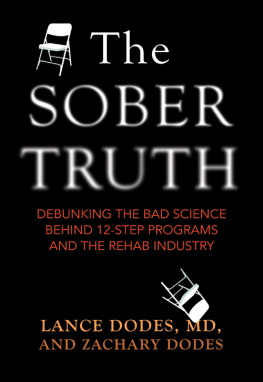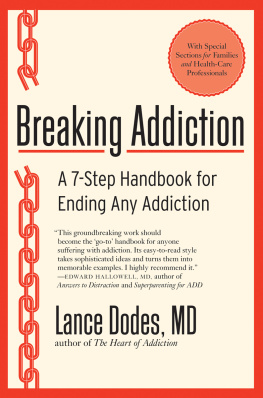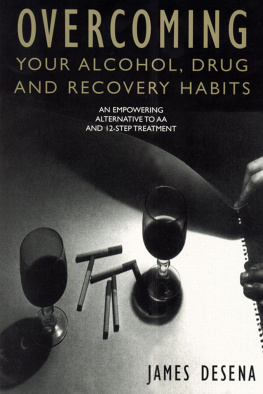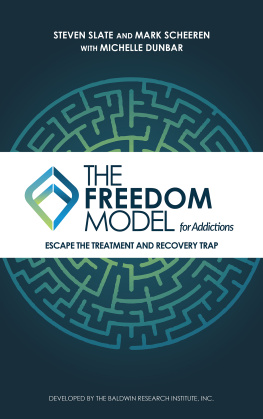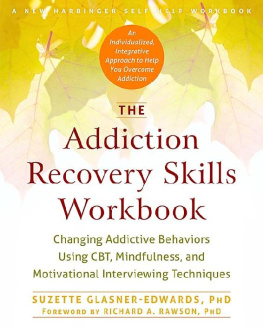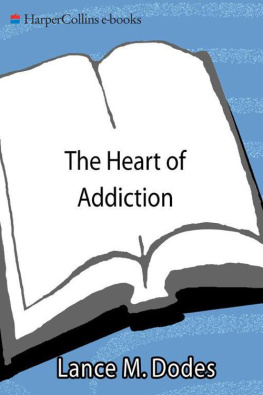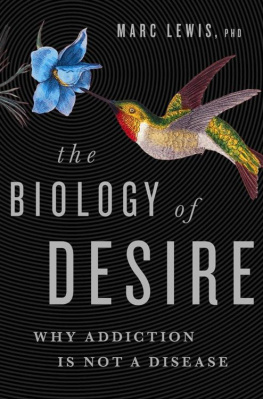ALSO BY LANCE DODES
Breaking Addiction: A 7-Step Handbook for Ending Any Addiction
The Heart of Addiction: A New Approach to Understanding and Managing Alcoholism and Other Addictive Behaviors

For the many people who struggle daily with addiction, their families, and friends, and for our wonderful wives, Connie and Farrah.
PREFACE
ALCOHOLICS ANONYMOUS WAS PROCLAIMED the correct treatment for alcoholism over seventy-five years ago despite the absence of any scientific evidence of the approachs efficacy, and we have been on the wrong path ever since. Today, almost every treatment center, physician, and court system in the country uses this model. Yet it has one of the worst success rates in all of medicine: between 5 and 10 percent, hardly better than no treatment at all.
Most of the expensive, famous rehab centers that base their treatment on the Twelve Steps likewise have offered no evidence for their effectiveness. Most of them dont even study their own outcomes.
One would hope we could turn to science for careful studies of AA and its effectiveness. But science has failed us: the AA question was considered settled almost before it was asked, and what studies exist that claim to substantiate AA have been riddled with problems in both methodology and analysis. Nobody has ever carefully and rigorously reviewed these studies and reported the results to the public. In this book, we do just that.
The failure of addiction treatment in our country is especially discouraging since there are better ways to both understand addiction and treat it, and its costing us thousands of lives and billions of dollars. With this book, we hope to begin a more productive conversation.
A Note About Format This book was written by both of us, but because Lance has devoted his career to understanding addiction, we have decided to write it in the first person. Zacharys equal contributions are everywhere, however, from the quality of the writing to his sharp understanding of good and bad science. Neither of us could have written this book alone.
CHAPTER ONE
THE PROBLEM
ALCOHOLICS ANONYMOUS IS A part of our nations fabric. In the seventy-six years since AA was created, 12-step programs have expanded to include over three hundred different organizations, focusing on such diverse issues as smoking, shoplifting, social phobia, debt, recovery from incest, even vulgarity. All told, more than five million people recite the Serenity Prayer at meetings across the United States every year.
Twelve-step programs hold a privileged place in our culture as well. The legions of anonymous members who comprise these groups are helped in their proselytizing mission by hit TV shows such as Intervention, which preaches the gospel of recovery. Going to rehab is likewise a common refrain in music and film, where it is almost always uncritically presented as the one true hope for beating addiction. AA and rehab have even been codified into our legal system: court-mandated attendance, which began in the late 1980s, is today a staple of drug-crime policy. Every year, our state and federal governments spend over $15 billion on substance-abuse treatment for addicts, the vast majority of which are based on 12-step programs. There is only one problem: these programs almost always fail.
Peer-reviewed studies peg the success rate of AA somewhere between 5 and 10 percent. That is, about one of every fifteen people who enter these programs is able to become and stay sober. In 2006, one of the most prestigious scientific research organizations in the world, the Cochrane Collaboration, conducted a review of the many studies conducted between 1966 and 2005 and reached a stunning conclusion: No experimental studies unequivocally demonstrated the effectiveness of AA in treating alcoholism. This group reached the same conclusion about professional AA-oriented treatment (12-step facilitation therapy, or TSF), which is the core of virtually every alcoholism-rehabilitation program in the country.
Many people greet this finding with open hostility. After all, walk down any street in any city and you are likely to run into a dozen people who swear by AAeither from personal experience or because they know someone whose life was saved by the program. Even people who have no experience with AA may still have heard that it works or protest that 5 to 10 percent is a significant number when were talking about millions of people. So AA isnt perfect, runs this thread of reasoning. Have you got anything better?
There are good answers to these objections, and they will take up a considerable portion of this book. For now, I will simply say that there are indeed better treatments for addictionbut the issues with AAs approach run far deeper than its statistical success rate. While its praiseworthy that some do well in AA, the problem is that our society has followed AAs lead in presuming that 12-step treatment is good for the other 90 percent of people with addictions.
Any substantive conversation about treatment in this country must reckon with the toll levied when a culture encourages one approach to the exclusion of all others, especially when that culture limits the treatment options for suffering people, ignores advances in understanding addiction, and excludes and even shames the great majority of people who fail in the sanctioned approach.
THE AA MONOPOLY
AA began as a nonprofessional attempt to grapple with the alcoholism of its founders. It arose and took its famous twelve steps directly from the Oxford Group, a fundamentalist religious organization founded in the early twentieth century. It came to life on the day that its founder, Bill Wilson, witnessed a bright flash of light in a hospital room.
Although the fledgling organization lacked any scientific backing, research, or clinical experience to support its method, AA spread like wildfire through a country desperate for hope at the end of Prohibition and in the midst of the Great Depression. It soon became immaterial whether AA worked well or worked at all: it had claimed its place as the last best hope for beating the mighty specter of addiction. It had become the indispensable treatment, the sine qua non of addiction recovery in the United States. And science looked away.
AA has managed to survive, in part, because members who become and remain sober speak and write about it regularly. This is no accident: AAs twelfth step expressly tells members to proselytize for the organization: Having had a spiritual awakening as the result of these Steps, we tried to carry this message to alcoholics, and to practice these principles in all our affairs. Adherence to this step has created a classic sampling error: because most of us hear only from the people who succeeded in the program, it is natural to conclude that they represent the whole. In reality, these members speak for an exceptionally small percentage of addicts, as we will see.
Beyond these individual proselytizing efforts, AA makes inflated claims about itself. Its foundational document, Alcoholics Anonymous (commonly referred to as the Big Book and a perennial best seller), spells out a confident ethos regularly endorsed by AA members:
Rarely have we seen a person fail who has thoroughly followed our path. Those who do not recover are people who cannot or will not completely give themselves to this simple program, usually men and women who are constitutionally incapable of being honest with themselves. There are such unfortunates. They are not at fault; they seem to have been born that way. They are naturally incapable of grasping and developing a manner of living which demands rigorous honesty. Their chances are less than average. There are those, too, who suffer from grave emotional and mental disorders, but many of them do recover if they have the capacity to be honest.

